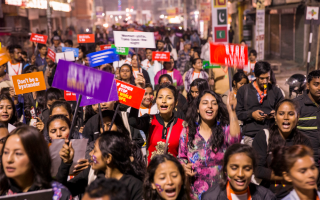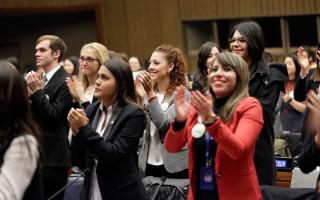21st Stabilization and Reconstruction Management Senior Course
The 21st Stabilization and Reconstruction Management Senior Course, co-organized by UNSSC and the Italian Army's Post-Conflict Operations Study Center, provides leaders with the skills to navigate complex post-conflict environments. The course emphasizes policy coherence, inter-agency collaboration, and the integration of military and civilian roles in stabilization and reconstruction. Through expert lectures, panel discussions, and case studies, participants gain practical insights into the legal, political and security dimensions of post-conflict operations.
In a world marked by protracted conflicts and fragile transitions, effective leadership and management in stabilization and reconstruction is more critical than ever. The Stabilization and Reconstruction Management Senior Course brings together senior military officers, policymakers, and practitioners to strengthen their capacity to design and implement strategies that foster sustainable peace. Rooted in a comprehensive, cross-sectoral approach, the course provides a unique platform for dialogue, learning, and collaboration across institutions.
By the end of the course, participants will be able to:
- Identify the diverse range of actors involved in stabilization and reconstruction.
- Differentiate the roles of military and civilian components in stabilization and reconstruction.
- Explain the geographical, political, and economic factors influencing these processes.
- Recognize the importance of inter-agency cooperation.
The course employs a mix of interactive learning methods designed to foster both knowledge and practice. Participants will engage in high-level lectures by senior military instructors and academics, video teleconferences with field experts, and dynamic panel discussions on key issues. Practical case study analyses further enable participants to apply concepts to real-world challenges, while ample opportunities are provided to ask questions and exchange directly with experienced practitioners and subject-matter experts.
The programme offers a comprehensive overview of the political, legal, economic, and security dimensions of stabilization and reconstruction. It begins with an exploration of the current geo-strategic scenario and global challenges, before moving into the multifaceted environment of stabilization and reconstruction, examining approaches of the United Nations, the European Union, NATO, and other key actors.
A strong emphasis is placed on cross-cutting agendas, including Women, Peace and Security and Youth, Peace and Security, as well as the treatment of vulnerable populations and victims in post-conflict societies. Participants also gain an in-depth understanding of Security Sector Reform, with sessions on security force assistance, stability policing, and the role of international financial institutions such as the World Bank in supporting peacebuilding.
The course concludes with a global comparison of stabilization approaches, highlighting the role of emerging actors and providing participants with practical insights to design context specific strategies grounded in a comprehensive and collaborative approach.
The course is open to UN personnel and colleagues from affiliated organizations, both at headquarters and in the field. It is particularly designed for senior military officers (Colonel rank and above) and senior civilian practitioners in governmental institutions, while also welcoming policymakers and practitioners from international and non-governmental organizations, as well as academics interested in post-conflict stabilization and reconstruction.
The tuition fee is entirely covered by the UNSSC. Participants or their sponsoring organizations are responsible for covering all travel and accommodation expenses. As part of the admission process, applicants are required to submit a motivation letter outlining the relevance of the course to their professional responsibilities or area of study.


